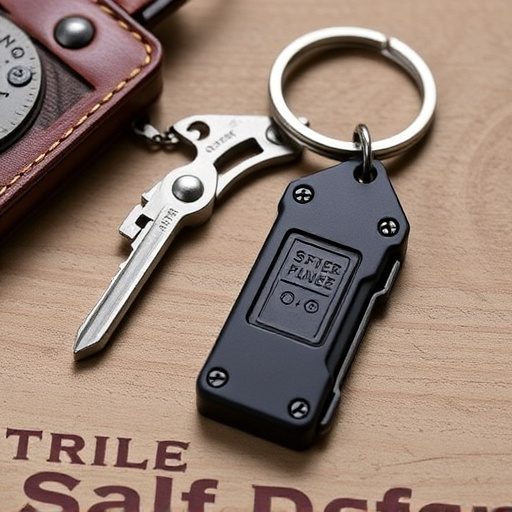Understanding the legal landscape is crucial for prospective owners of Titanium Tactical Keychain Weapons, which are classified as "non-lethal" or "less-lethal" but subject to varying jurisdictions. U.S. states have distinct laws governing their carry, with some like Texas and Florida having less stringent rules compared to California or New York. Responsible ownership involves regularly checking state and regional regulations, understanding weapon definitions, identifying permissible carrying locations, obtaining permits, and considering the consequences of self-defense use. Strict selling, importing, and exporting rules underscore the need for informed awareness of local laws.
“In an era where personal safety is paramount, the popularity of titanium tactical keychain weapons has surged. However, navigating the legal landscape surrounding these compact self-defense tools can be intricate. This article serves as a comprehensive guide for owners and enthusiasts of titanium tactical keychains, delving into the legal definitions and regulations that govern their use. We explore specific requirements in key states, ensuring compliance, and highlighting best practices to foster safe ownership.”
- Understanding Legal Definitions and Regulations: Unraveling the Laws Surrounding Titanium Tactical Keychain Weapons
- Key States and Their Specific Requirements for Carrying Tactical Keychains
- Ensuring Safety and Compliance: Best Practices for Titanium Tactical Keychain Owners
Understanding Legal Definitions and Regulations: Unraveling the Laws Surrounding Titanium Tactical Keychain Weapons
Understanding the legal definitions and regulations surrounding Titanium Tactical Keychain Weapons is crucial for anyone considering owning or carrying such devices. These innovative tools, designed as compact self-defense options, operate under a web of laws that vary significantly from one jurisdiction to another. In many regions, they are classified as “non-lethal weapons” or “less-lethal alternatives” to traditional firearms, subject to specific regulations on their possession, use, and transportation.
The legal status of Titanium Tactical Keychain Weapons is often determined by factors such as their design, force output, and intended purpose. Some regions may permit them for personal protection only, while others might allow their use in specific professions like law enforcement or security. Moreover, regulations on selling, importing, and exporting these devices are stringent, requiring proper licensing and compliance with safety standards to ensure they don’t fall into the wrong hands. Staying informed about local laws and industry best practices is essential for responsible ownership and adherence to the Titanium Tactical Keychain Weapons legal framework.
Key States and Their Specific Requirements for Carrying Tactical Keychains
In the United States, individual states have varying laws regarding the carrying of tactical or enhanced keychains that could be perceived as weapons. When considering a Titanium Tactical Keychain Weapon, it’s crucial to understand these legal nuances. Each state has its own definition of what constitutes a ‘weapon’ and restrictions on objects that can be carried openly or concealed. For instance, some states allow certain types of tactical keychains as self-defense tools without a permit, while others may require permits for similar devices.
States like Texas and Florida, known for their gun-friendly laws, might have less stringent rules compared to California or New York, where regulations are stricter. Carrying a Titanium Tactical Keychain as a weapon could be legal in one state but not another. Therefore, it’s essential to research and understand the specific requirements of your state and any local jurisdictions before considering open or concealed carry.
Ensuring Safety and Compliance: Best Practices for Titanium Tactical Keychain Owners
Ensuring safety and compliance is paramount for owners of titanium tactical keychains, especially considering their potential as weapons. In many jurisdictions, carrying tactical gear, including keychains designed for self-defense, is subject to specific legal requirements. Owning a Titanium Tactical Keychain means staying informed about local laws pertaining to concealed carry and weapons possession.
Best practices involve regularly checking state and regional regulations, as these can vary widely. Staying up-to-date on legal definitions of what constitutes a weapon, permissible carrying locations, and any necessary permits or licenses is crucial. Additionally, responsible owners should consider the potential consequences of using their keychain in self-defense, including potential charges related to aggressive use or misuse of force.
When it comes to the legal landscape of titanium tactical keychain weapons, understanding both federal and state regulations is paramount. By familiarizing yourself with the definitions, requirements, and best practices outlined in this article, you can ensure compliance and promote safe carrying of these devices. Remember, staying informed about your local laws is crucial for responsible ownership of any weapon, including titanium tactical keychains.
